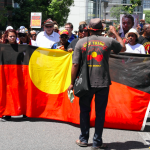Stop Imprisoning People for Unpaid Fines

The Western Australian Government is under mounting pressure to revoke laws which imprison people for unpaid fines.
WA is the only jurisdiction in Australia where you can go directly to prison for unpaid fines. Many of the people who fall foul of this law are poor or otherwise vulnerable, and according to statistics, more than 1,000 people have been sent to gaol every year since 2010 for failing to pay their fines.
Indigenous Entertainer Rubeun Yorkshire, who is a dancer with the theatre company Yirra Yaakin and will soon appear on an ABC TV series, is one of the most recent victims of this law.
Mr Yorkshire was recently arrested and sent to prison for unpaid fines dating back to 2013. He is adamant that despite previously being on a repayment plan, he was not aware that there was still a balance of $1700 remaining.
Yorkshire was arrested during a day at the beach and spent several nights in a two-man cell at Hakea Prison, before his fines were paid-off by an anonymous benefactor.
He is now adding his voice to the mounting pressure on the WA Government to change the law.
The law
Currently in WA, people who do not pay their fines are given two options:
- Enter into a payment plan, or
- Convert the fine to a Community Service Order (‘CSO’).
If they fail to do either, they will pay off $250 for each day they spend behind bars.
The possibility of being sent to prison is supposed to act as a deterrent – but it has not worked in WA where an increasing number of people have ‘elected’ to go to prison since 2010, simply because they have no ability to pay the fines, and therefore no other alternative.
This means that not only is the fine left unpaid, taxpayers are left to fund the time behind prison walls, which costs up to $345 per day.
A 2014 report titled “Locking in Poverty” found that the law disproportionately impacts upon women and Indigenous Australians.
It revealed that one in three women in prison, and one in six Indigenous inmates, were sent to prison for defaulting on fines.
Western Australia is the only state where this law still exists. New South Wales changed the law in the late 1980 when a young man died in serving a prison sentence for refusing to pay a parking fine. He was only in custody for four days when another inmate bashed him to death.
The death of Ms Dhu
The WA Government has been considering changing the laws since 2014, after the inquest into the death in custody of Aboriginal woman Ms Dhu who was being detained at South Headland after being arrested for unpaid fines of around $3,500.
As a single mother who was in a domestic violence situation with no means to pay the fines, Ms Dhu elected to go to prison. She had been there for just three days when she died as a result of a serious misdiagnosis. A Coroner found that Ms Dhu received poor treatment from both the police and detention centre medical staff, and that as a result, she died of septiscaemia and pneumonia. She was just 22 years of age.
In the wake of Ms Dhu’s death, a state coroner called for the laws to be changed, but there has been no real progress by the State Government since.
However, a recent media statement from the Attorney General’s department promises to introduce reforms in the first half of this year.
Fundraising to free women
In the meantime, Queensland-based advocacy group Sisters Inside has launched a campaign to fund the release of Aboriginal single mothers imprisoned for unpaid fines.
The campaign has set a fundraising target of $99,000 to help release 100 women, and has so far raised more than $82,000.
The law in NSW
Section 125(1) of the Fines Act 1996 (NSW) (“the Act”) states that:
“A person is not liable to be committed to a correctional centre for a failure to pay a fine or other penalty by the due date.”
A fine is defined by section 57 of the Act as a monetary amount that a person is ordered to pay by a magistrate, judge or justice of the peace for committing an offence. This can include offences like drink driving or drug possession.
After fine has been imposed, the NSW State Debt Recovery Office (SDRO) has a number of ways of forcing people to pay up.
It can impose additional fees, suspend a driver licence, cancel vehicle registration or stop someone from doing business with the Roads Maritime Service (RMS). It also has the power to seize and auction off a person’s property in order to pay off the fine, and a person can be ordered to undertake community service.
However, section 87(1) provides that: “A fine defaulter is liable to be committed to a correctional centre in accordance with this Act for a failure to comply with a community correction order or community service order”, which can be seen as an indirect route to prison for those who fail to pay their fines.
It essentially that a person ordered to undertake community service due to unpaid fines can have that order revoked and be sent to prison if he or she fails to comply.
Many believe the WA Government should stop enforcing a regime which so clearly impacts disproportionately upon the poor and fails to achieve its primary objective of deterrence.
Going to court for a traffic offence?
If you are going to court for a traffic offence, call or email Sydney Criminal Lawyers anytime to arrange a free first consultation with an experienced, specialist traffic lawyer who will accurately advise you of your options, the best way forward, and fight for the optimal outcome in your specific situation.








